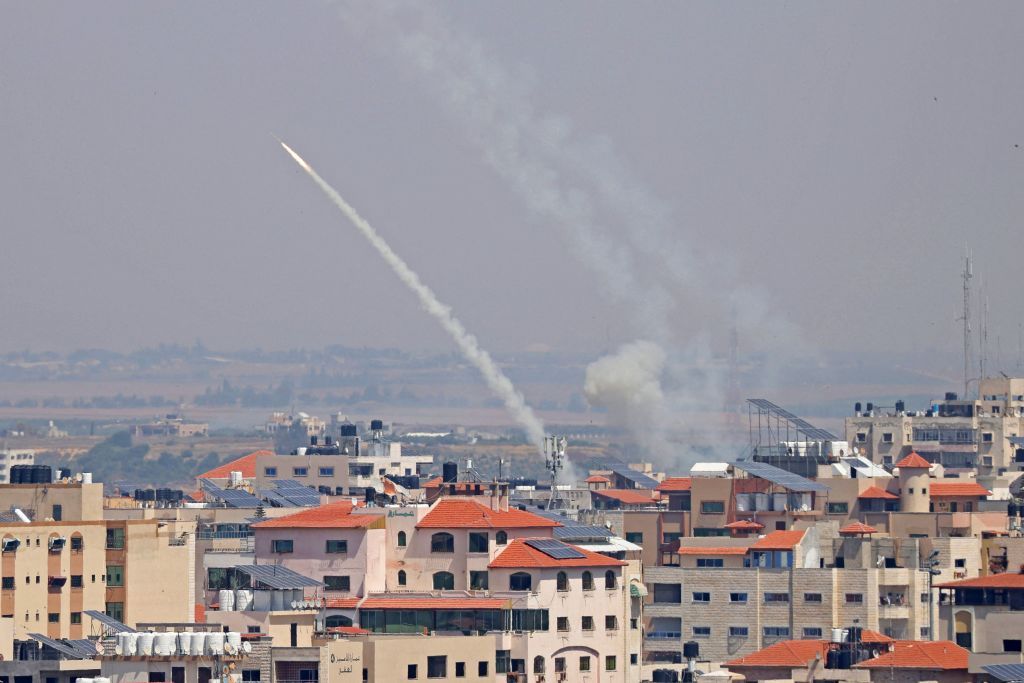If you get your news on the Middle East from the BBC, every so often Israel appears to go mad and begins lustily bombing Palestinian civilians. No rhyme or reason. Jerusalem is simply pummelling Gaza for the hell of it.
This impression is often created by the BBC’s approach to reporting on Israel and terrorism. The story invariably begins when Israel responds to attacks, with those original attacks deemed insufficiently newsworthy until then or reported as a retaliation to some provocation. Then, once Israel engages, the inciting incidents are quietly smuggled into the coverage but framed as just another round in the cycle of violence. Thus self-defence is cast as aggression, and aggression as tit-for-tat.
Here’s how the BBC World Service introduced an item this morning:
‘To the Middle East now, where Palestinian officials say that two young men have been killed during an overnight Israeli army raid near Jenin in the occupied West Bank. It came hours after Israel carried out air strikes on Gaza, targeting militant commanders. Fifteen people were killed, including ten civilians. Israel’s prime minister Benjamin Netanyahu warned Palestinian militants that any retaliation would be met with a crushing response.’
Two ‘young men’ killed by Israeli soldiers. Gazan civilians killed by air strikes. The Israelis demanding there be no retaliation. If this was your first encounter with these events, you would probably come away from it with a less than sympathetic view of Israel’s actions.
Fortunately for Israel, and unfortunately for the BBC, Israeli journalist Lahav Harkov was on the line waiting to be interviewed on the situation. Harkov, who writes for the Jerusalem Post, was asked if the timing of Israel’s operations was significant. She responded:
‘It’s significant because of details that you left out in your introduction. For example, the two Palestinian men shot in Jenin overnight were shooting at IDF soldiers and the IDF soldiers shot them back… The operation in Gaza came after Palestinian Islamic Jihad shot 102 rockets towards Israeli civilian centres. Then Israel took a week or so to prepare its operation and use its intelligence and then, yes, retaliated. But retaliated in a way that was commensurate with international law because they shot at civilians and Israel shot at the terrorists who were leading this organisation and this operation to shoot at civilians.’
In a 40-second burst, Harkov provided listeners with facts, context, chronology and background. This is what used to be known as ‘journalism’. It may have been less than a minute but Harkov should bill the BBC for a full reporting shift.
Astonishingly, the presenter decided to have another go. ‘If the operation was to target the Islamic Jihad,’ she enquired, and ‘we have ten civilians dead’, did this ‘show us where the thought process of Mr Netanyahu and the coalition government and the leadership is at the moment’?
Harkov knocked this one out of the park, too:
‘Every civilian life lost is tragic. But, for a terrorist group that does not have its own separate military bases and hides out amongst civilians, that is not such a high number. When you look at photographs of the operation, you see that a specific apartment in an entire building is what was blown up. It’s not that they were taking down the whole building, hundreds of people, to get one person. It was a pinpoint operation.’
Harkov’s responses were a pinpoint operation too, a precision strike against the BBC’s singular and faulty approach to reporting on Israel. In response, the BBC say: ‘Throughout Newsday’s three-hour programme, we reported on the developments in the Middle East between Israel and the Islamic Jihad leaders impartially and provided differing perspectives on the recent conflict. More broadly, the BBC has covered this story accurately and responsibly with detail on the recent history across our coverage.’
The Corporation may well think that is correct. The BBC’s approach is certainly not the result of a conspiracy, as some Israelis and their sympathisers around the world assume. Yes, the BBC has its ideologues in news and current affairs and it seems to apply lower corporate and journalistic standards in its coverage of Israel. This is, after all, the organisation that hired someone who declared ‘Hitler was right’ as the ‘Palestine specialist’ at BBC Monitoring. But the BBC’s bias against Israel reflects institutional culture, the political attitudes of the sort of people who work in news and current affairs, and patterns and assumptions so long embedded that even veteran BBC staff would struggle to account adequately for the uniquely malign frame the Corporation applies to Israel. That may not be much comfort but cultures, groupthink and frames can all be changed.
Change is sorely needed. Israel makes its share of mistakes. Sometimes it can be its own worst enemy. But the BBC’s flawed journalism makes a country trying to defend itself in a complex environment with very few options look like a bloodthirsty aggressor. The BBC should not give Israel a free ride. It should be rigorous, curious, sceptical and challenging, but at present it is sloppy, partial, hostile and distorting. Until it changes, the Corporation’s coverage of Israel and the Palestinians will only continue to discredit itself.







Comments